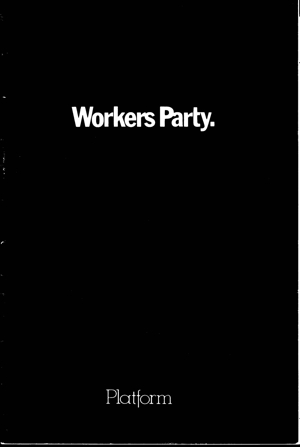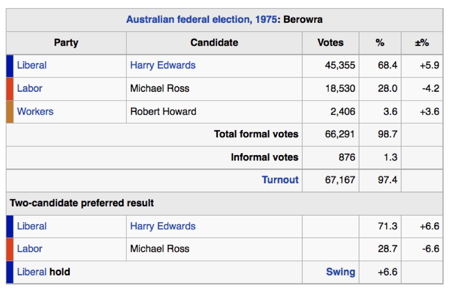
Date: 28 Oct. 2020
Revised: 6 Oct. 2022
Nine years ago I was on a panel organised by the Mises Seminar in Sydney, 26 November, 2011 on Australian Libertarian Politics – “On the Workers Party” You Tube. I found the notes of my presentation recently and reproduce them here with some revisions.
I have also put online a copy of the wonderfully radical Workers Party Platform of 1975 written largely by Bob Howard. See the new section on Australian Classical Liberals and Libertarians and copies of the Platform: HTML version or facsimile PDF version.
I concluded with some thought about the strategy for achieving radical change, stating that I was a “Hayekian” in that I found his essay “Intellectuals and Socialism” (1949) persuasive. Since then I have written more on the strategy needed for bringing about a free society, namely
- a “Liberty Matters” online discussion “On the Spread of Classical Liberal Ideas” (March 2015) “ Paper.
- and a research paper “Entrepreneurs, Investors, and Scribblers: An Austrian Analysis of the Structure of Production and Distribution of Ideas”. A paper given at the Southern Economics Association, New Orleans, November 21-23, 2015. Paper.
Here are the comments and reflections I gave at the panel presentation in 2011 (with some revisions).
Some Thoughts on the Workers Party
Here are some random thoughts:
- re-reading the WP Platform (WPP) I was struck by how “Randian” it now seems. This is both good and bad. Good because it shows how they/we were struggling to be consistent and the most consistent libertarian political theory we knew about at that time was that of Rand’s. This shows considerable naivete as a “party of principle” usually has a very short life span and we knew it. Thus, the choice of the name “Workers Party” was to meant to be provocative and perhaps a bit whimsical.
- the badge of our consistency was the motto [the “fundamental principle”] which appeared at the bottom of each page – “No man or group of men has the right to initiate the use of force, fraud or coercion against another man or group of men”. As Merilyn Giesekem/Fairskye said in an issue of freeEnterprise this was unfortunately sexist but reflected Rand’s own view of the world and her speech patterns. This motto is straight out of Rand’s writings.
- the thorough-going radicalism of the WPP is reflected in the dependence on the “fundamental principle” for all things; and that it applied to EVERYTHING and EVERYBODY, especially the state, politicians, and government functionaries.
- how anti-state the WPP was. The best example was the idea of new departments to be set up in a WP regime designed specifically to dismantle the state [See Section 2.4]. This was and is truly revolutionary and no one else has ever thought of this to my knowledge. The aim was to reduce all government departments to 5 within 12 months of achieving office. Only the Dept. of Defence would remain after the job of dismantling the rest of the government had ended. It was proposed that there would be four new departments which would oversee the dismantling of the Australian state:
- Review of Laws and the Legal System.
- Reduction of Taxation.
- Reduction of Government Control
- Rehabilitation of Tax Consumers
- the exaggerated hopes and false expectations we had in 1975 can be summed up in the following points:
- the “if only they knew” fallacy – the idea that if only people knew “the facts” or heard the philosophy expressed in a coherent way, the statist scales would fall from their eyes and they would all immediately become supporters/converts
- the “immediatist” fallacy – the idea that immediate radical change can take place without having laid the intellectual foundations many decades before. The world view of academics, journalists, intellectuals, party activists had been shaped by decades of education in and propaganda about the justice of and necessity for massive government intervention in the economy. This mindset would not change because of the activity of a few ideologues in one election campaign.
- the “we are different from everybody else” fallacy which takes the following forms:
- the idea that an intense burst of electoral activity would not physically and mentally exhaust us (I think a major reason for the collapse of the WP was this exhaustion and we hadn’t prepared for it);
- the idea that because of the purity and consistency of our ideas “we” would not be tempted to play the traditional games of power which all political activists are subject to, we would never sell out by watering down our principles in order to have more “mass appeal”.
- 1972-1975 was a truly radicalising moment which helped foster the emergence of the WP. The coming to power of the Labor Party in 1972 and its radical socialist agenda galvanized anti-socialists (even within the Liberal Party) and gave a group like us in the WP an opportunity to have our free market and anti-socialist message heard. However, once the Labor Party experiment collapsed in chaos, bankruptcy, and massive electoral defeat this radicalising moment passed and so did the WP. There was a naive hope that the new PM Malcolm Fraser (who had supposedly read Ayn Rand) would work for some of the radical reforms the WP had advocated.
- It might be interesting to compare the WP’s strategy of 1975 with that of Ron Paul within the American Republican Party which burst into bright flame briefly and then fizzled out.
One of the Key Sections in the WPP [2.4]
2.4.– Reducing Government
See the relevant section.
On attaining office, the Party will:
Immediately abolish death duty, gift duty, capital gains tax and sales tax, and gradually reduce to an absolute minimum all other taxes, including personal and company taxes; and, as soon as possible thereafter, reduce all other taxes until government activities as far as practical, can be financed through charges for special services rendered.
At all times, the Party will ensure that the government spends no more than it receives.
Government expenditure will be continually reduced. In addition to the measures outlines elsewhere, the Party will, within 12 months of attaining office, examine the functions of all government departments, with a view to gradually reducing them to five in number:
The Department for Defence Against Internal and External Aggression.
The Department for the Review of Laws and the Legal System.
The Department for the Reduction of Taxation.
The Department for the Reduction of Government Control.
The Department for the Rehabilitation of Tax Consumers.
(The latter four departments would be phased out on completion of their roles.)
Some Personal Reflections
I came across the writings of Ayn Rand during the summer holidays between years 10 and 11 of high school [1972-73]. I read The Fountainhead and then Atlas Shrugged in short order.
Sometime during 1973 I found an advertisement in the Sydney Morning Herald for a meeting of the “Ayn Rand Discussion Group” in Sydney. My parents very reluctantly let me go to the meeting. It was there that I met Bob Howard and the other Sydney-based libertarians. I was barely 16 years of age.
I recall that Bob and his friends were in the middle of a fiery debate over the proper role of the state. Some of them had just discovered Murray Rothbard’s theory of anarcho-capitalism and were challenging the orthodox Randians who of course believed in “limited government”. As a freshly minted Randian I found this a fascinating debate and I threw myself into it. I remember reading Roy Childs’ “Open Letter to Ayn Rand” (originally written in 1969) which sealed the debate for me in favour of anarcho-capitalism.
I was a by-stander while the WPP was being written. As a friend of Bob Howard I discussed matters with him but was not directly part of the official writing committee.
I worked with Bob on his election campaign in December 1975 when he stood for the seat of Berowra in Sydney. It was during this campaign that I met my wife-to-be who was also active in his election campaign [was this then a “campaign romance”] with who I’ve been ever since.
Here are the election results. Bob Hoard got 3.6% of the primary vote.

I watched with some sadness as the WP disintegrated shortly after 1975 election. It changed its name to the “Progress Party” in order to overcome the perceived stigma of the name “Workers Party”, and then disappeared.
The path for radical change I have adopted since then has been a version of the Hayekian “Intellectuals and Socialism” strategy, namely the very long-term strategy Hayek developed after studying how socialists achieved change in the early and mid-20thC. You might summarize this as attempting to influence the people (academics) who influence the people who originate and implement government policy (journalists, lobbyists, policy makers, politicians), who in turn influence voters who vote in elections. The groups I have been active with ever since, the Institute for Humane Studies (celebrated its 50th anniversary 2011) and the Liberty Fund (50th anniversary 2010), have followed this Hayekian strategy, more or less.
